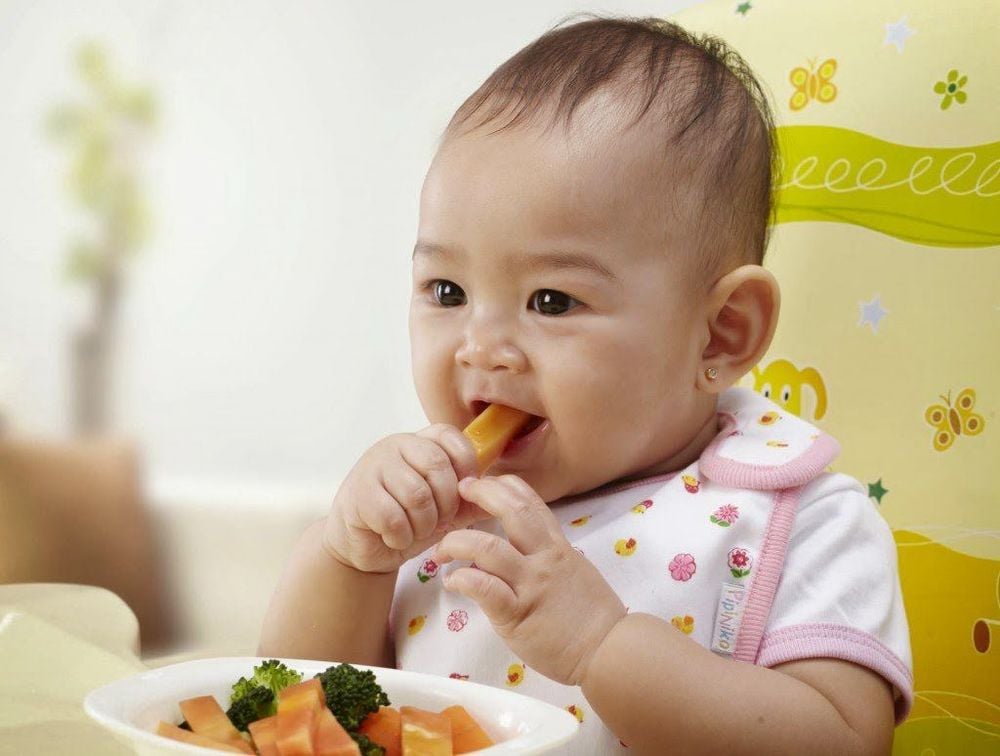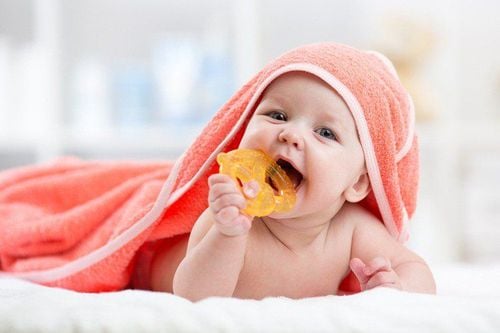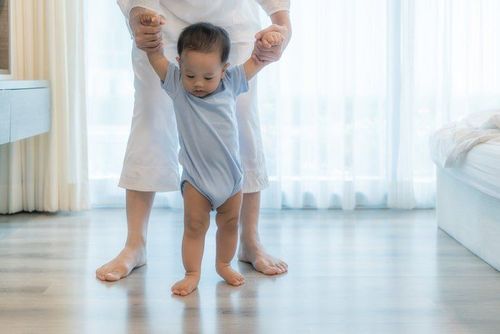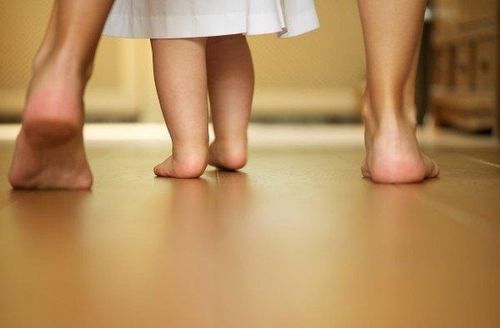This is an automatically translated article.
The article is professionally approved by Doctor Nguyen Thai Ngoc Chau - Department of Pediatrics - Neonatology - Vinmec Phu Quoc International General HospitalAnd Master, Doctor Huynh Bao Toan - Department of Pediatrics - Neonatology - Vinmec Nha Trang International General Hospital. The doctor has 13 years of experience in the field of Pediatrics.
By the end of 33 weeks, you should see your baby making good progress both physically and mentally. This time can be characterized by random mood swings - your baby will giggle or suddenly start crying uncomfortably. Even in terms of food, your child will not be consistent, he will eat food one day but the next day he will not like it, except milk.
1. Changes in sleep of 33 weeks old baby
There seem to be big changes in many aspects of babies by the time they reach 33 weeks, which includes changes in sleep. Baby doesn't sleep as much as in previous stages. Although a 33-week-old baby can still sleep up to 11 or 12 hours a day, these sleep patterns seem to be more disrupted, especially at night. In some cases, babies may wake up many times at night not just asking for food.
Bước sang tuần thứ 33 trẻ không còn ngủ nhiều như giai đoạn trước nữa
1 1-2 hours: This is the deepest sleep period in a baby's sleep, they will hardly be awakened by anything anything during this time. The next 3-4 hours: The baby sleeps in a lethargic state and can wake up at any time Final stage: The baby wakes up and prepares for the next sleep. Babies at this stage may be awake and fussy during the night many times. Instead of using lullabies to put your baby to sleep, wait a few minutes to see if he can fall back asleep on his own. Otherwise, gently pat the baby, be careful not to turn on the lights or change the baby's lying position. Your baby will probably still cry, but will quickly fall asleep after a few minutes.
This is also the stage when children can pronounce words with more complex syllables. For example, instead of just saying the word “dad”, the child can say the word “grandma”. Your baby will also try to imitate the mouth and jaw movements of adults when speaking. Even if they do not understand what the child is saying, parents or loved ones should also respond to the child's words with enthusiasm. Another important thing to remember is that the child's motivation to speak is the desire to imitate adults. The more parents talk, read or sing to the baby, the more linguistic thinking develops and the faster the baby will speak.
By this time, your baby has switched to solid foods. While babies may still enjoy breast milk for some days, family foods will be their favorites most days. You can start giving your baby mashed or pureed foods, simply by feeding them with a spoon in small amounts.
Although the baby's molars are not yet developed, the child still chews well thanks to the gums. Your child should be able to chew most foods, eliminating foods that are difficult to chew. Always keep a few treats for your baby whenever you're out, in case you have something that doesn't suit your child (e.g. Fast food). If your child doesn't show much inclination towards solid foods, it's best not to force them to eat. This can lead to bad problems in the future. You must remember that even though your baby is supposed to be able to eat solid foods by the end of 9 months, breast milk is still his main source of nutrition.

Nướu phát triển khỏe mạnh giúp trẻ có thể nhai hầu hết các loại thực phẩm
2. Safe for 33 weeks old baby
Eight-month-old babies are in the process of trying to stand and walk on their own two feet. Babies tend to cling to anything sturdy to get up. Sometimes we will see a baby trying to cling to a table or chair to get up. However, once your baby is able to stand up, it will be very difficult for the baby to sit down. Gently remove your baby's hand from the chair and help her sit down on the floor. The child may immediately resume the act of clinging to the chair and getting up, do not stop but let the child continue to do it. Those are the steps to help children master this skill thereby helping them to walk earlier.Parents, relatives or caregivers should show children how to sit down safely by bending the waist and plopping down. The first few times the baby will probably hurt and cry, laugh and praise the child with clapping and comforting them. The more difficult sitting is, the more children will overcome their fear and eventually they will find a way to sit down without hurting themselves.
In addition, in the 33-week-old baby stage, parents and children's relatives also need to pay attention to the types of toys bought for the baby. Make sure to buy toys that are appropriate for your baby's age. Currently, on the market, there are many types of toys with no labels, of unknown origin and are widely sold and can pose many potential risks to children's health. Some toys are made from toxic plastics or covered with lead paint, while some toys are small, which can cause children to suffocate when swallowed.
8 months old baby is often very active, they always try to explore and try everything around, so whatever is placed within the reach of the baby needs to be ensured maximum safety.
At this age, your baby will be given several vaccines during the 6-month check-up period and the next set of vaccines will be scheduled when he or she is 9 months old. However, check with your pediatrician for more information on the immunization schedule. Your child can get the meningitis vaccine or the flu shot if you think the baby is at risk.
In case you have missed your vaccination session, you should definitely see your doctor to schedule a make-up shot. If not vaccinated on time, children can get dangerous diseases such as measles, meningitis...

Trẻ 33 tuần tuổi vẫn phải tiêm một số loại vắc-xin để tăng cường đề kháng
3. How to teach a 33-week-old baby
Parents are the children's first teachers. Children can absorb things very quickly that their parents teach them, so the actions of parents at this stage are very important. Here are three basic ways that parents can apply to help their children learn better including practice, sharing and direction:Practice: It is the most intuitive way. Parents themselves will perform a simple action, such as opening the lid of a box, then encourage and let the baby do it himself. You can also make the game more interesting by putting in the box your baby's favorite foods. This can completely stimulate the child's thinking about cause and effect, what will he get when he performs this action. Because babies love to imitate adults, parents are a good role model, especially at the age of 33 weeks to motivate babies to try harder. Sharing: Sharing means that parents should join their children in their activities. For example, they can hold hands and guide a baby to grasp an object and move it. Children will learn how to do things that adults do. That makes it easier for her to try it on her own. Orientation: Orientation is more complex, requiring parents to break a large task into smaller, manageable tasks. For example, if you want to teach your child how to build a large picture, parents can divide them into smaller shapes that are easy for the child to fold, and then let the child put them together to form a large shape. In addition, there are some other tips to help take better care of your baby:
Co-sleeping is the best option for you to get extra sleep at night. If your baby starts crying in the middle of the night, comfort him only if he continues for a few minutes. In most cases, your child will quickly get through a deep sleep. Teething toys help ease the discomfort associated with teething, so let your child bite into cold and chilled foods a few times a day.

Cho trẻ sử dụng đồ chơi mọc răng một vài lần trong ngày
4. 33 weeks old baby milestones
Children are moving around more at this stage, and parents may also notice that their baby's games have become much more independent. At this stage, the baby can play alone for a long time. However, this also brings certain annoyances to parents or babysitters. The baby will try to move farther and farther, exploring every corner of the house. This sometimes makes parents worry, afraid that the baby may be hurt if it hits other objects. However, there are a few tips that can assist them in looking after children at this age:Talk to your child often: Stories can make children pay more attention to their parents and can keep them within reach. their control Try to keep an eye on the child regularly. If possible, join them to play. Motivate your child: As your child learns to use his body parts to move, encourage him by letting him know how excited he is. It helps children understand that safe actions can be accompanied by positive feedback from parents. This is a time of change and growth for the baby and even the parents. So cherish every moment, difficulties during this period are inevitable and part of normal child development.
It is during this age that the baby begins to form a personality and becomes very playful. Your child will be a joy to watch, although your sleep may be compromised. So always be on the lookout for your baby's first words and bring your camera so you don't miss any of your kid's hilarious acts.
At 33 weeks old is a period of rapid development of children both physically and mentally. Your 8-month-old baby will sleep less and be more active, trying to learn to stand and walk on their own by clinging to other sturdy objects. Children also always want to imitate the actions of their parents, so this is also the time when parents or caregivers can teach and set a good example for children to follow.
When the child has health abnormalities, parents can take the child to Vinmec Health system for timely examination and treatment.
In addition, 8-month-old babies need 5mg of elemental zinc/day to eat well, reach the correct height and weight and exceed the standard. Zinc plays a role in affecting most biological processes taking place in the body, especially the breakdown of nucleic acids, proteins... Organs in the body when zinc deficiency can lead to a There are a number of diseases such as neurological disorders, irritability, etc. Therefore, parents need to learn about the role of zinc and guide them to appropriate zinc supplements for their children.
In addition to zinc, parents also need to supplement their children with other important vitamins and minerals such as lysine, chromium, B vitamins,... errands.
Please regularly visit Vinmec.com website and update useful information to take care of your baby and family.
Reference source: parents.com; mamanatural.com














